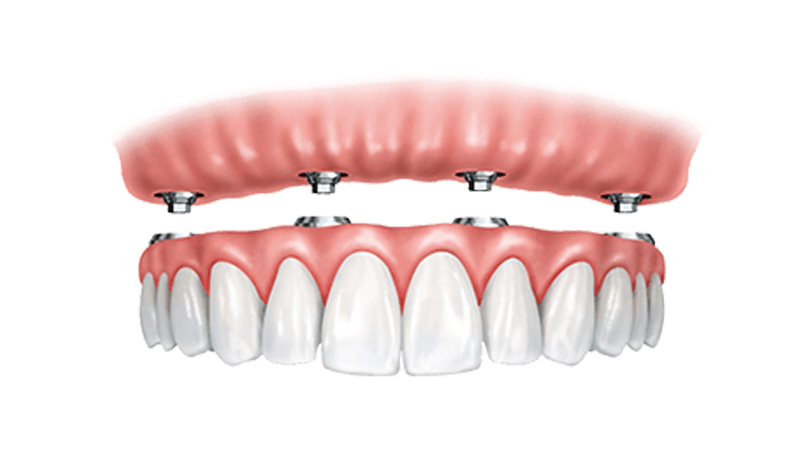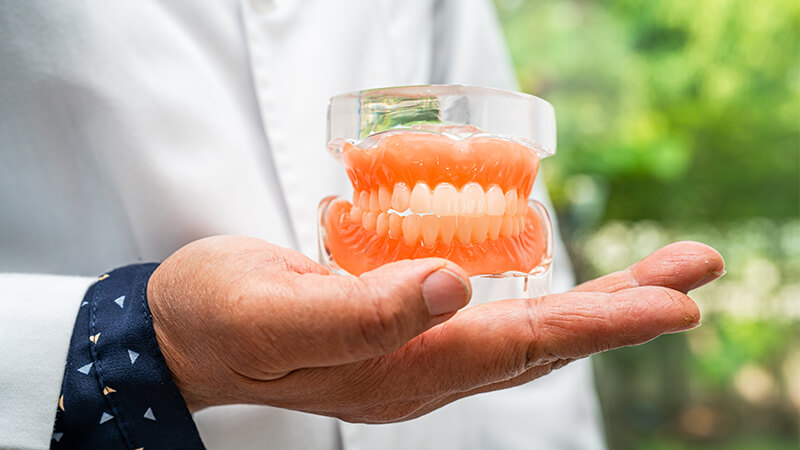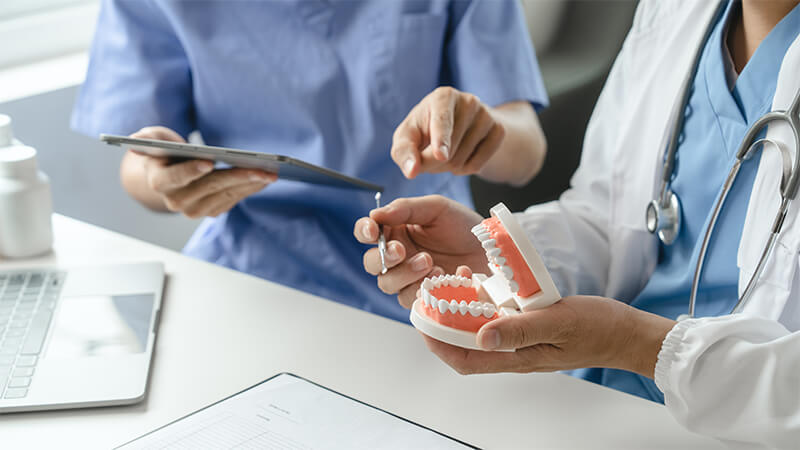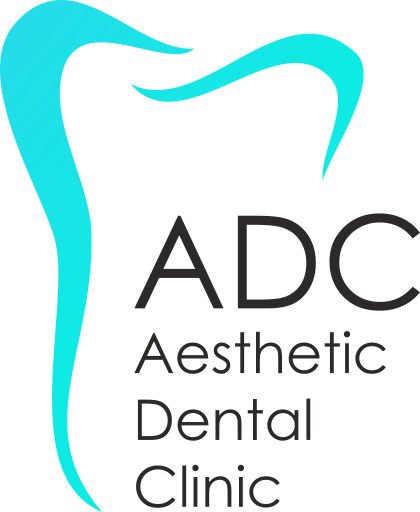Implant-supported dentures, what are they?
Implant-supported dentures are prosthetic work that replaces multiple teeth at once. It is similar to a traditional denture. But instead of resting on top of your gums, it has tremendous retention and stability from implants. Dental implants are tiny threaded posts that replace the roots of missing teeth.
Dentures supported by implants offer improved stability for chewing, eating, speaking, and according to research from American universities, they improve the quality of human life, increasing the average life by 5 years.

Do I need implant-supported dentures?
Our specialized Dentists at Galani Dental Clinic can recommend implant supported dentures if most or all of your teeth are missing. Individuals who are missing multiple teeth in the greater jaw area can benefit from implant-supported partial dentures.
Our specialized Dentists will tell you and explain which option is best for your case.
To qualify for implant-supported dentures, you must have enough bone in your jaw in certain strategic places for the dental implants to be placed. In many cases, dental bone grafts can help add volume and density to areas where you have lost bone.
Do implant-supported dentures come out?
When it comes to implant-supported dentures, there are Fixed and Removable options. The treatment that is right for you depends on several factors, including the health of your jawbone, your medical history, and your personal preferences.
Removable dentures supported by implants
This type of denture “clips” onto the dental implants and provides increased retention compared to not resting on implants. It stays firmly in place until you remove it. That is, it goes in and out of the mouth.
With this option, you can take out your dentures daily for a more thorough cleaning.
Fixed dentures supported by implants
A fixed denture—sometimes called a hybrid denture—is permanently attached to dental implants in your jawbone. You cannot remove it at home, but your dentist can remove it for maintenance when necessary. With this option, you cannot remove your dentures to clean them. You’ll brush them just like natural teeth, and you can clean them underneath using interdental brushes and other special cleaning tools.

Are implant-supported dentures effective?
Implant-supported dentures are a realistic and effective solution to tooth loss. Unlike their traditional counterparts, implant-supported dentures do not shift, slide or wobble when you chew, eat or speak. In fact, many traditional denture wearers eventually upgrade to implant-supported dentures because they are more comfortable and secure.
What is the difference between All-on-4 and implant-supported maxillary dentures?
The term “All-on-4” refers to a specific type of fixed implant denture. This method replaces an entire arch of missing teeth using just four dental implants.
How long do implant-supported dentures last?
With proper care and maintenance, dental implants can last a lifetime. For best results, you should replace your dentures (the dentures that sit over your implants) every 15 to 20 years.
Advantages of implant-supported dentures
Implant-supported dentures offer a number of advantages. For example:
• They do not slip like traditional dentures.
• They help prevent bone loss in your jaw. (This is because implants mimic your natural tooth roots and stimulate the nerves in your jaw, so the bone doesn’t resorb.)
• They look like natural teeth.
• Oral health, function and appearance are restored.
• They last much longer than traditional dentures.

Therapeutic procedure with implant-supported denture
Step 1: Treatment plan
If you have existing full dentures, please wear them or bring them with you during your visit with our Dental Specialist. The dentist will discuss your concerns and possible treatment options with you.
To check the condition of the bones and make detailed diagnoses, a 3D CT scan is performed. Please highlight any questions and concerns to our qualified Dentist in your treatment plan.
Step 2: Initial treatments and checks
Implants have a 2 to 6 month healing period called osseointegration.
While you wait for your implant to be safely integrated into the jawbone, you may need a temporary denture for aesthetic and functional purposes. If you already have an existing full set of dentures prior to dental implant treatment, it may be possible to simply adjust or reposition your full set of dentures for post-implant surgery. If you do not have full dentures, we can make your permanent dentures which you can wear before or right after surgery. After the implant surgery, you can then wear the dentures during the osseointegration period.
Step 3: 1st stage. Dental implant placement
After your treatment plan is confirmed. We place the dental implants in selected positions. Implant surgery is usually done under local anesthesia. Being done with local anesthesia allows for quick recovery and is a simple procedure. You can go home immediately after your implants are placed. Under local anesthesia, the implant placement procedure usually takes about 1 to 3 hours depending on the number of implants selected.
Step 4 : 2nd Stage. Dentures
Implants are left to heal for about 3 to 6 months or longer. During implant treatment a 3D CT X-ray is taken to check the osseointegration of the implants.
Your dentures are then made in the dental laboratory (unless we have already made them).
Finally, above the posts of the implants, a clasp is placed, which we “activate” and adjust the clasp onto the denture.
Now the smile you dreamed of is yours!
How many implants are needed for an implant-supported denture?
According to recent studies done by universities in America and Switzerland, the minimum number of implants for the lower jaw is 2 implants and for the upper jaw it is 4 implants.
What is the recovery time?
After dental implants are placed, most people feel normal within a week. Your implants will continue to heal and integrate with your jaw over the coming months. In the meantime, you will wear a therapeutic denture or the permanent denture that you will wear afterwards, but with a soft coating so as not to injure the tissues of the mouth after the surgery.
A therapeutic denture is functional, but does not attach to your dental implants. This allows your implants to heal properly.
On average, it takes between three and six months to heal after dental implants are placed. It may take longer in some cases, especially if you also had a bone graft.
When can I go back to work or school?
In most cases, you can return to daily activities in two to three days. To reduce the risk of discomfort and bleeding, avoid vigorous exercise for at least 48 hours after dental implant surgery.
Is it safe to eat with implant-supported dentures?
YES. Once your dental implants have healed and your final denture is in place, you can eat all your favorite foods without worry.
How do I care for my implant-supported dentures?
Proper maintenance helps ensure that your new implant-supported dentures last as long as possible.
To keep them in top condition:
- Brush your dentures at least twice a day.
- Soak removable dentures in denture solution overnight.
- Brush fixed dentures with a soft-bristled toothbrush and non-abrasive toothpaste.
- Brush and floss thoroughly around your dental implants.
- Visit Our Dental Office regularly for examination and cleaning.




